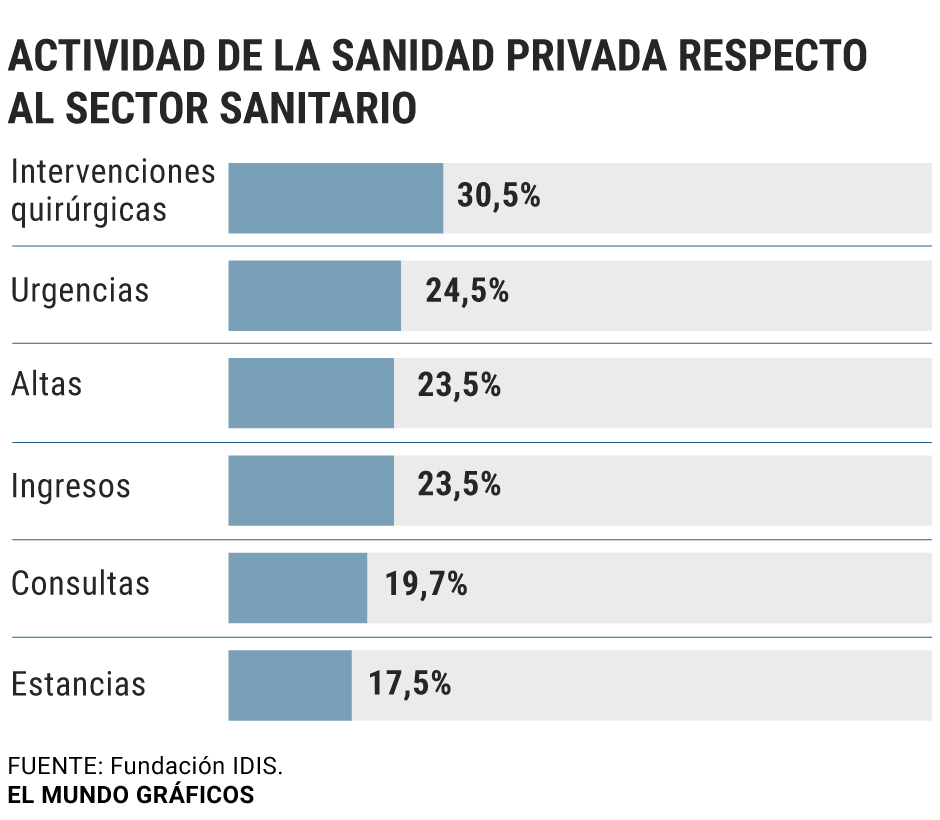A patient who uses private healthcare exclusively saves the public coffers 1,291 euros and if he receives the service from both healthcare systems, around 564. Figures that manage to avoid the State spending a total of 16 billion euros a year. This is estimated by the new report of the Institute for the Development and Integration of Health (IDIS Foundation) that has been presented by its president, Juan Abarca ; its general secretary, Ángel de Benito ; and its general director, Marta Villanueva .
The document, called "Private Health, Providing Value: Analysis of the 2020 situation" , is "more important than ever" this year due to the health crisis caused by Covid-19. Juan Abarca has valued the collaboration between public and private healthcare: "It has been a success. For the first time, the healthcare system has functioned with patients in mind and not with political and business interests. This is evident proof of the sector's commitment "he has remarked.
The general secretary of the foundation has also pointed out that 20% of the patients affected by the coronavirus have been treated in private hospitals and 14.2% of them admitted to the ICU . "Taking into account the state of collapse of public hospitals, without the contribution of private hospitals many patients could not have been treated," said Abarca, who insisted that public health has always needed private: "This it is an objective reality. The public system is not capable of absorbing the demand of society by its own means. "
In this sense, he acknowledged that he hopes that the Covid-19 crisis "will allow the collaboration between the two systems to be normalized at once and remove the tension that exists between them."
Marta Villanueva, for her part, explained that 8.7 million Spaniards voluntarily choose to be insured : "It is a high percentage, it gives us an idea of the size and power of private healthcare," he pointed out. Likewise, the general director has made reference to the report to highlight that 2.6% of health spending in Spain corresponds to the private sector .
Private healthcare, allied with public healthcare
Cooperation between the two health sectors is key "to guarantee the sustainability and solvency of the system and create a single network that provides our country with health care not only of maximum excellence and quality, but also accessible," reads the document.
The report presented reveals the significant healthcare activity in this sector that allows resources to be released to the public health facility. For example, in 2017, private hospitals carried out 30.5% of surgical interventions, recorded 23.5% of discharges, and attended 24.5% of emergencies across the country .
Centers with substitute concerts or those integrated into a network for public use are not included in these data because they are considered by the Ministry of Health as public hospitals. If the data from these centers were added, the percentages of assistance from the private health sector would increase dramatically .
Improves the population's access to healthcare
According to the report, private healthcare allows people who require their service to receive "agile, diverse and quality assistance".
The document refers to the RESA Report from last year that sets out the results of this sector. Thus, the average waiting time to summon the patient to additional tests remains, in line with the last five years, below eleven days ; and the wait of this to receive the results is less than four days.
On the other hand, the global average time that elapses until a surgical intervention is around a month. Likewise, cancer patients receive their treatment in less than 16 days after their diagnosis .
More than 200,000 jobs created
Another contribution of the private health sector to the economy is the high employment it generates. It is estimated that a total of 269,515 professionals work in all the activities that are part of the sector in our country . Of these, around 63% work in the out-of-hospital setting and 37% in the hospital setting.
By professional category, it is estimated that 23% of professionals in the private health sector are doctors, 25% nurses and the remaining 52% correspond to other health and non-health professionals.
According to the criteria of The Trust Project
Know more- Coronavirus
- Health
DescalingCastellón accounts for a third of new cases in the province
Health The risks of sunbathing after confinement
JusticeThe first conviction for not protecting the toilets: "Health knew the rapid spread of the virus"
See links of interest
- News
- Translator
- Programming
- Calendar
- Horoscope
- Classification
- League calendar
- Films
- Cut notes
- Themes
- Multiple sclerosis
- West Ham United - Chelsea
- Extremadura UD - Racing de Santander
- Ponferradina - Fuenlabrada
- Real Betis - Villarreal
- Real Madrid - Getafe, live

